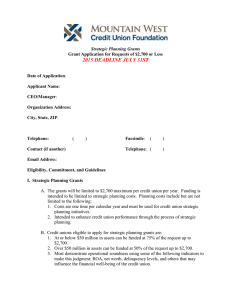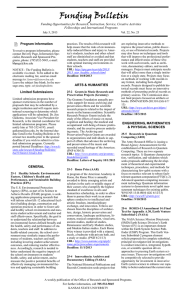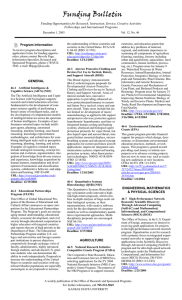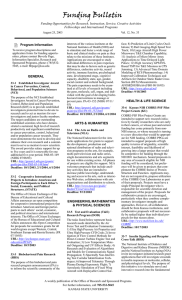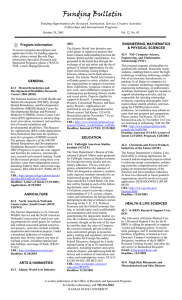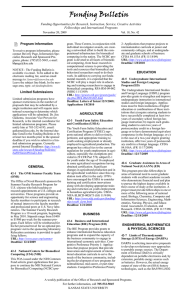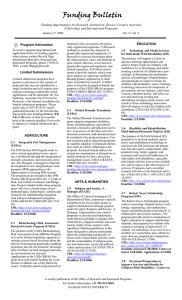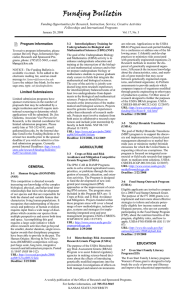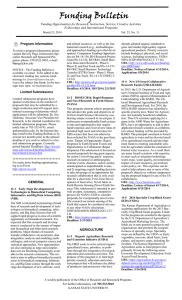Funding Bulletin
advertisement
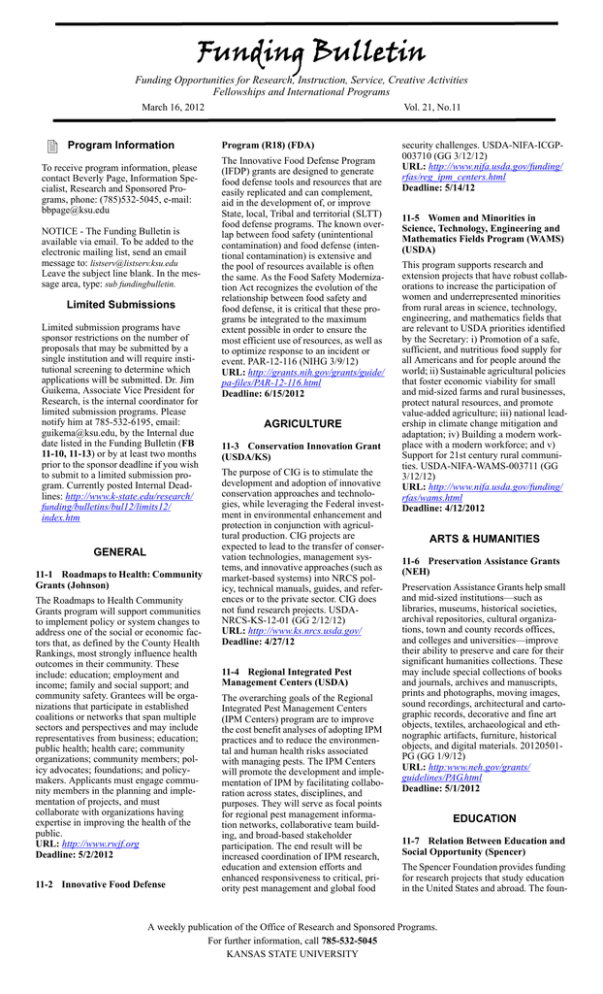
Funding Bulletin Funding Opportunities for Research, Instruction, Service, Creative Activities Fellowships and International Programs March 16, 2012 Program Information To receive program information, please contact Beverly Page, Information Specialist, Research and Sponsored Programs, phone: (785)532-5045, e-mail: bbpage@ksu.edu NOTICE - The Funding Bulletin is available via email. To be added to the electronic mailing list, send an email message to: listserv@listserv.ksu.edu Leave the subject line blank. In the message area, type: sub fundingbulletin. Limited Submissions Limited submission programs have sponsor restrictions on the number of proposals that may be submitted by a single institution and will require institutional screening to determine which applications will be submitted. Dr. Jim Guikema, Associate Vice President for Research, is the internal coordinator for limited submission programs. Please notify him at 785-532-6195, email: guikema@ksu.edu, by the Internal due date listed in the Funding Bulletin (FB 11-10, 11-13) or by at least two months prior to the sponsor deadline if you wish to submit to a limited submission program. Currently posted Internal Deadlines: http://www.k-state.edu/research/ funding/bulletins/bul12/limits12/ index.htm GENERAL 11-1 Roadmaps to Health: Community Grants (Johnson) The Roadmaps to Health Community Grants program will support communities to implement policy or system changes to address one of the social or economic factors that, as defined by the County Health Rankings, most strongly influence health outcomes in their community. These include: education; employment and income; family and social support; and community safety. Grantees will be organizations that participate in established coalitions or networks that span multiple sectors and perspectives and may include representatives from business; education; public health; health care; community organizations; community members; policy advocates; foundations; and policymakers. Applicants must engage community members in the planning and implementation of projects, and must collaborate with organizations having expertise in improving the health of the public. URL: http://www.rwjf.org Deadline: 5/2/2012 11-2 Innovative Food Defense Vol. 21, No.11 Program (R18) (FDA) The Innovative Food Defense Program (IFDP) grants are designed to generate food defense tools and resources that are easily replicated and can complement, aid in the development of, or improve State, local, Tribal and territorial (SLTT) food defense programs. The known overlap between food safety (unintentional contamination) and food defense (intentional contamination) is extensive and the pool of resources available is often the same. As the Food Safety Modernization Act recognizes the evolution of the relationship between food safety and food defense, it is critical that these programs be integrated to the maximum extent possible in order to ensure the most efficient use of resources, as well as to optimize response to an incident or event. PAR-12-116 (NIHG 3/9/12) URL: http://grants.nih.gov/grants/guide/ pa-files/PAR-12-116.html Deadline: 6/15/2012 AGRICULTURE 11-3 Conservation Innovation Grant (USDA/KS) The purpose of CIG is to stimulate the development and adoption of innovative conservation approaches and technologies, while leveraging the Federal investment in environmental enhancement and protection in conjunction with agricultural production. CIG projects are expected to lead to the transfer of conservation technologies, management systems, and innovative approaches (such as market-based systems) into NRCS policy, technical manuals, guides, and references or to the private sector. CIG does not fund research projects. USDANRCS-KS-12-01 (GG 2/12/12) URL: http://www.ks.nrcs.usda.gov/ Deadline: 4/27/12 11-4 Regional Integrated Pest Management Centers (USDA) The overarching goals of the Regional Integrated Pest Management Centers (IPM Centers) program are to improve the cost benefit analyses of adopting IPM practices and to reduce the environmental and human health risks associated with managing pests. The IPM Centers will promote the development and implementation of IPM by facilitating collaboration across states, disciplines, and purposes. They will serve as focal points for regional pest management information networks, collaborative team building, and broad-based stakeholder participation. The end result will be increased coordination of IPM research, education and extension efforts and enhanced responsiveness to critical, priority pest management and global food security challenges. USDA-NIFA-ICGP003710 (GG 3/12/12) URL: http://www.nifa.usda.gov/funding/ rfas/reg_ipm_centers.html Deadline: 5/14/12 11-5 Women and Minorities in Science, Technology, Engineering and Mathematics Fields Program (WAMS) (USDA) This program supports research and extension projects that have robust collaborations to increase the participation of women and underrepresented minorities from rural areas in science, technology, engineering, and mathematics fields that are relevant to USDA priorities identified by the Secretary: i) Promotion of a safe, sufficient, and nutritious food supply for all Americans and for people around the world; ii) Sustainable agricultural policies that foster economic viability for small and mid-sized farms and rural businesses, protect natural resources, and promote value-added agriculture; iii) national leadership in climate change mitigation and adaptation; iv) Building a modern workplace with a modern workforce; and v) Support for 21st century rural communities. USDA-NIFA-WAMS-003711 (GG 3/12/12) URL: http://www.nifa.usda.gov/funding/ rfas/wams.html Deadline: 4/12/2012 ARTS & HUMANITIES 11-6 Preservation Assistance Grants (NEH) Preservation Assistance Grants help small and mid-sized institutions—such as libraries, museums, historical societies, archival repositories, cultural organizations, town and county records offices, and colleges and universities—improve their ability to preserve and care for their significant humanities collections. These may include special collections of books and journals, archives and manuscripts, prints and photographs, moving images, sound recordings, architectural and cartographic records, decorative and fine art objects, textiles, archaeological and ethnographic artifacts, furniture, historical objects, and digital materials. 20120501PG (GG 1/9/12) URL: http:www.neh.gov/grants/ guidelines/PAG.html Deadline: 5/1/2012 EDUCATION 11-7 Relation Between Education and Social Opportunity (Spencer) The Spencer Foundation provides funding for research projects that study education in the United States and abroad. The foun- A weekly publication of the Office of Research and Sponsored Programs. For further information, call 785-532-5045 KANSAS STATE UNIVERSITY dation seeks to shed light on the role education plays in reducing economic and social inequalities—as well as, sometimes, reinforcing them—and to find ways to more fully realize education’s potential to promote more equal opportunity. Expanded opportunity is important not only to a society’s economic well being but to the character of its civic, cultural, and social life as well. URL: http://www.spencer.org/ content.cfm/education-and-socialopportunity Deadline: 4/30/2012, 7/9/2012, 10/3/ 2012 ENGINEERING, MATHEMATICS & PHYSICAL SCIENCES 11-8 NIST Consortium for PostComplementary Metal Oxide Semiconductor (CMOS) Nanoelectronics Research Grant Program (NIST) NIST is soliciting proposals for financial assistance from eligible proposers to support basic research focused on the longterm research needs of industry in the area of post-CMOS nanoelectronics. There is a critical need to create novel nanoelectronics technologies that operate at low energies and that can outperform today’s CMOS technologies. These technologies should include innovative device, circuit, and architecture approaches which can involve logic, memory, sensors, or analog components. 2012-NIST-POST-CMOS01 (GG 3/15/12) URL: http://www07.grants.gov Deadline: 4/16/2012 11-9 Computational Methods for Decision Making (DoD) This announcement describes an applied research program, entitled Computational Methods for Decision Making, to be launched under the ONRBAA12-001, Long Range Broad Agency Announcement for Navy and Marine Corps Science and Technology. The Office of Naval Research (ONR) is interested in receiving white papers on the Computational Methods for Decision Making Applied Research Program which are partitioned into four (4) thrusts areas, (1) Resource Optimization, (2) Automated Image Understanding, (3) Information Integration, and (4) Cyber Security thrusts. Together these thrusts seek to develop new technological capabilities that support Naval Operations across a wide variety of missions. 12-SN-0009 (GG 3/14/ 12) URL: http://www07.grants.gov Deadline: White Papers 4/13/2012; Proposals 7/3/2012 tions of the large-scale implementation of nanomanufacturing innovations. The mode of support is Nanoscale Interdisciplinary Research Teams (NIRT). Proposals submitted to this program must address at least one, and preferably more than one, of the following interconnected themes: Novel processes and techniques for continuous and scalable nanomanufacturing; Directed (e.g. physical/chemical/biological) self-assembly processes leading to heterogeneous nanostructures with the potential for high-rate production; Fundamental scientific research in well-defined areas that are compellingly justified as critical roadblocks to scale-up; Principles and design methods to produce machines and processes to manufacture nanoscale structures, devices and systems; and/or Long-term societal and educational implications of the large-scale production and use of nanomaterials, devices and systems, including the lifecycle analysis of such nanomaterials, devices and systems. An academic institution- a university, or a campus in a multi-campus university - may submit no more than one proposal on which it is the lead organization in response to this solicitation. NSF 12-544 URL: http://www.nsf.gov/pubs/2012/ nsf12544/nsf12544.htm Deadline: Internal 4/4/2012; Proposals 6/4/2012 11-11 High-Assurance Cyber Military Systems (HACMS) (DARPA) DARPA is soliciting innovative research proposals in the area of the clean-slate development of software for high-assurance cyber-physical systems. Proposed research should investigate innovative approaches that enable revolutionary advances in science or systems. Specifically excluded is research that primarily results in evolutionary improvements to the existing state of practice. Technical Areas are as follows: Military Vehicle Experts; Operating Systems; Control Systems; Research Integration; and Red Team—This technical area is focused on assessing the security of the targeted vehicles, including the defense vehicles provided by Military Vehicle Experts, the challenge problems, and the open-source vehicle(s). A proposer should submit no more than one proposal as a prime contractor. Such a proposal may cover one to five technical areas. DARPA-BAA-12-21 (GG 3/1/12) URL: http://www.darpa.mil/ Opportunities/Solicitations/ I2O_Solicitations.aspx Deadline: Internal 5/1/2012; Applications 7/12/2012 school students. STEP-UP is a national program designed to provide eight to twelve weeks of summer research education and training for students underrepresented in biomedical research on a national basis, including individuals from disadvantaged backgrounds, individuals from underrepresented racial and ethnic groups, and individuals with disabilities. STEP-UP aims to expose students to and increase interest in NIDDK mission areas including diabetes, endocrinology, metabolism, nutrition, obesity, and digestive, liver, urologic, kidney, and hematologic diseases. RFA-DK-12-005 (NIHG 3/9/12) URL: http://grants.nih.gov/grants/guide/ rfa-files/RfA-DK-12-005.html Deadline: Letters of Intent 4/9/2012; Applications 5/9/2012 11-13 NCRR Science Education Partnership Award (SEPA) (R25) (NIH) NCRR encourages applications to its Science Education Partnership Award (SEPA) program for the development and evaluation of innovative research education programs to improve PreK-12 research career opportunities and the community’s understanding of the health science advances supported by the National Institutes of Health (NIH)funded clinical and basic research. SEPA encourages dynamic partnerships between biomedical and clinical researchers and PreK-12 teachers and schools and other interested organizations. Particular importance will be given to applications that target PreK-12 and/or ISE/media topics that may not be addressed by existing curriculum, community-based or ISE/ media activities. An applicant organization or institution may submit only one application. PAR-10-206 (GG 3/7/12) URL: http://grants.nih.gov/grants/guide/ pa-files/PAR-10-206.html Deadline: Internal 4/22/2012; Applications 6/22/2012 R.W. Trewyn, Vice President for Research Jim Guikema, Associate Vice President for Research Caron Boyce, Administrative Specialist Preaward Section Paul Lowe, Director Anita Fahrny, Assistant Director Kathy Tilley, Rich Doan, Carmen Garcia, Adassa Roe, Katie Small, Rex Goff, Susan Klein, Sharon Zoeller Funding Information Specialist & Editor Beverly Page Development Director HEALTH & LIFE SCIENCES 11-10 Scalable Nanomanufacturing (SNM) (NSF) 11-12 NIDDK Short-Term Education Program for Underrepresented Persons (STEP-UP) (R25) (NIH) The National Science Foundation (NSF) announces a second year of a program on collaborative research and education in the area of scalable nanomanufacturing, including the long-term societal implica- This Funding Opportunity Announcement (FOA) invites applications from institutions to coordinate a NIDDK Short-Term Education Program for Underrepresented Persons (STEP-UP) that targets high Mary Lou Marino Human Subjects, Animal Care & Use, and Biosafety Gerald P. Jaax, Associate Vice President, Research Compliance Heath Ritter, Compliance Monitor Adrian Self, Administrative Specialist Congressional Relations Sue Peterson, R.W. Trewyn A weekly publication of the Office of Research and Sponsored Programs. For further information, call 785-532-5045 KANSAS STATE UNIVERSITY
